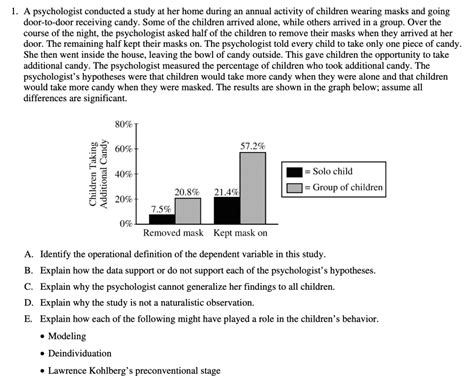Introduction
The Advanced Placement (AP) Psychology Exam is designed to assess students’ mastery of the foundational concepts and theories in psychology. The 2024 FRQ (Free Response Question) will evaluate students’ ability to apply their knowledge to real-world scenarios and demonstrate their critical thinking skills. This article provides a comprehensive guide to help students prepare for the 2024 FRQ.

Structure of the FRQ
The AP Psychology FRQ consists of two sections:
- Section I: Two short answer questions worth 2 points each
- Section II: One long answer question worth 6 points
Section I: Short Answer Questions
Section I questions are designed to test students’ recall and understanding of specific psychological concepts. Students will be asked to:
- Define a term or concept
- Describe a theory or research finding
- Explain the significance of a particular study or experiment
Section II: Long Answer Question
The long answer question in Section II requires students to demonstrate their ability to analyze and synthesize information. Students will be given a scenario or research study and asked to:
- Explain the psychological principles at work in the scenario
- Analyze the research findings and draw conclusions
- Discuss the implications of the research or scenario for real-world applications
Content Covered in the FRQ
The FRQ will cover a wide range of topics from the AP Psychology curriculum, including:
-
Biological Bases of Behavior
- The nervous system
- Sensation and perception
-
Cognitive Processes
- Learning and memory
- Intelligence and problem solving
-
Developmental Psychology
- Prenatal and infant development
- Childhood and adolescence
-
Social Psychology
- Group dynamics
- Prejudice and discrimination
-
Clinical Psychology
- Psychological disorders
- Treatment options
Tips for Answering the FRQ
Section I:
- Read the question carefully and identify the key term or concept.
- Be concise and provide specific examples to support your answer.
- Use technical vocabulary correctly.
Section II:
- Restate the question in your own words to demonstrate understanding.
- Identify the relevant psychological principles and theories.
- Analyze the research findings and draw logical conclusions.
- Discuss the implications of the research or scenario for practical applications.
- Organize your answer in a clear and structured manner.
Practice Questions and Resources
Practice questions and resources are essential for preparing for the AP Psychology FRQ. Students should:
- Use the College Board’s AP Psychology Exam website (https://apcentral.collegeboard.org/courses/ap-psychology)
- Take practice exams from reputable sources
- Join study groups or hire a tutor
- Review their notes and textbooks thoroughly
Conclusion
The AP Psychology 2024 FRQ is a challenging but rewarding assessment. By understanding the structure of the FRQ, studying the relevant content, and practicing answering questions, students can improve their chances of success. With careful preparation, they can demonstrate their mastery of psychology and earn a high score.
Additional Information
Table of Psychological Theories
| Theory | Description | Key Concepts |
|---|---|---|
| Behaviorism | Focuses on observable behavior and emphasizes the role of reinforcement and punishment | Stimulus-response, classical conditioning, operant conditioning |
| Cognitive Psychology | Examines mental processes such as thinking, memory, and problem solving | Schemas, attention, working memory |
| Humanistic Psychology | Emphasizes the role of free will, personal growth, and subjective experience | Self-actualization, unconditional positive regard, existentialism |
| Psychodynamic Psychology | Explores unconscious drives and conflicts that influence personality and behavior | Id, ego, superego, defense mechanisms |
Table of Research Methods
| Method | Description | Advantages | Disadvantages |
|---|---|---|---|
| Experiment | Manipulates an independent variable to observe its effect on a dependent variable | Control, high internal validity | Time-consuming, expensive |
| Quasi-Experiment | Similar to an experiment, but lacks random assignment | Less control, lower internal validity | Useful when random assignment is not feasible |
| Observational Study | Collects data without manipulating variables | Naturalistic, less reactive | Low internal validity, confounding variables |
| Correlational Study | Examines the relationship between two or more variables | Can identify trends, but cannot establish causation | Cannot control for confounding variables |
Table of Common Psychological Disorders
| Disorder | Symptoms | Prevalence |
|---|---|---|
| Anxiety Disorders | Excessive fear or anxiety | 19.1% |
| Mood Disorders | Depressed or elevated mood | 6.9% |
| Substance Use Disorders | Impaired control over substance use | 10.2% |
| Personality Disorders | Inflexible and maladaptive personality traits | 9.1% |
| Schizophrenia | Delusions, hallucinations, disorganized speech | 0.25-0.64% |
Strategies for Answering the FRQ
Effective Strategies:
- Read the question carefully and restate it in your own words.
- Identify the relevant psychological principles and theories.
- Use specific examples to support your analysis.
- Organize your answer in a clear and structured manner.
- Proofread your answer before submitting it.
Ineffective Strategies:
- Guessing the answer without providing any justification.
- Providing vague or irrelevant information.
- Using technical vocabulary without understanding its meaning.
- Writing an overly brief or disorganized answer.
